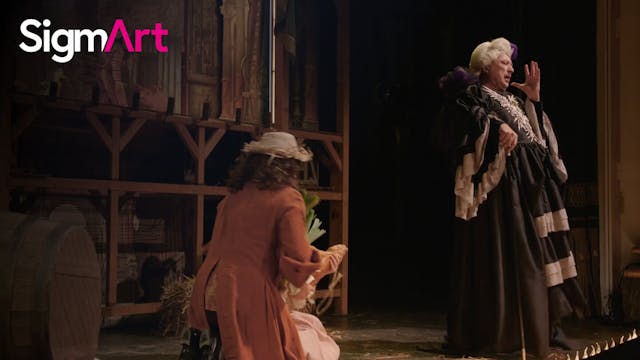"THE PILGRIM WOMAN" Comedy by Girolamo Bargagli
Comedy & Comic Opera
•
2h 4m
Language: French
The Pilgrim Woman ("La Pellegrina") is a 1579 play written by Girolamo Bargagli of Siena that had been performed for the first time on 2 May 1589 in Florence, after the author's death in 1586, on the occasion of the marriage of Ferdinand I de' Medici, Grand-Duke of Tuscany, with Christina of Lorraine, granddaughter of the former queen-mother of France, Catherine de' Medici. This was enhanced with six musical interludes, the intermedi for La pellegrina [de], with designs by Bernardo Buontalenti, known as the master of Florentine spectacle. Six then-famous composers from Florence contributed music, including some of the most virtuosic vocal writing of the period, early examples of monody. The opening aria, Dalle piu alte sfere, is believed to be by Emilio de' Cavalieri (Palisca, Norton Anthology of Music/ Heller, Music in the Baroque, p 23), although it is sometimes attributed to Antonio Archilei, whose wife Vittoria had sung it in the role of Armonia in the 1589 production.
Mixing for the first time different artistic disciplines, La Pellegrina marks the birth of Opera in the 16th century, long before Monteverdi’s Orfeo.
Total spectacle, encompassing Theatre, Music, Dance and Poetry, was not just a Wagnerian ideal, but also a Florentine reality!
In the spring of 1589, to celebrate the arrival of Christine de Lorraine, who was joining her new husband the Grand‐Duke Ferdinand de Medici, the Tuscan city prepared a thousand splendors. The capstone of the festivities: a performance of La Pellegrina, a comedy by Girolamo Bargagli, for which no fewer than seven different composers wrote the intermediary scenes played between the acts, accompanied by sumptuous decors and mechanical effects.
It is for these interludes that musical history remembers the event, because they are perhaps – 28 years before Monteverdi’s Orfeo and Jacopo Peri’s Euridice – the first attempt at theatrical action sung in music. In fact, Peri participated in the event, along with the greatest composers of the period. All or nearly all were members of the Camerata Fiorentina, a veritable artistic and humanist think tank of the Renaissance that, since 1573, sought to broaden the principles of recitar cantando (recitation by singing) in order to develop a new relationship between text and music, with the objective of achieving the greatest expression of the emotions: the opera.
Between the interludes, in place of the text by Bargagli, a new libretto by Rémi Cassaigne plunges us into the intrigues and internecine struggles, as arise in all intellectual debates, within this boiling Florentine cauldron from which would spring that artistic liberty and freedom of thought that we know today as the Baroque.
Direction: Judith Pacquier (Director), Etienne Meyer (Music Conductor)
Cast: Renaud Delaigue (Bardi), Vincent Bouchot (Rossi), Hugues Primard (Seriacopi), Philippe Grisvard (Cavalieri), Capucine Keller (Vittoria), Mariana Rewerski (Lucia), Lise Viricel (Margherita), Jean-Christophe Clair (Buontalenti), Olivier Coiffet (Pagolini), Guilhem Worms (Fabbri), Alvaro Valles (Berardi), Romain Bockler (Peri), Anthony Lo Papa (Pasquale), Jonathan Sells (Franz), Yannis Francois (Hans), Alice Habellion (Giove)
Up Next in Comedy & Comic Opera
-
MAM'ZELLE NITOUCHE Satiric Opera by H...
Language: French
Subtitles: English, French, German, Italian, SpanishMam'zelle Nitouche is a vaudeville-opérette in three acts by Hervé. The libretto is by Henri Meilhac and Albert Millaud. This story of a respectable musician, transforming himself into a songwriter at night, is partly inspired...
-
ATYS IN MADNESS Parody for Puppets by...
Language: French
Subtitles: English, French, German, Italian, SpanishA parody is above all a hilarious spectacle. The prodigious success of Atys parodies in the 18th century is based on the phenomenon of degradation; one of them, Atys travesti de Carolet (parody for puppets created at the Foire...
-
LE DEVIN DU VILLAGE Comic Opera by Je...
[Language: French]
Le Devin du village is the first success of Jean-Jacques Rousseau (1712-1778) in the field of opera. “Musical interlude in one act”, the work is composed over three weeks in the spring of 1752, on a libretto by Rousseau himself, then premiered at the court of Fontainebleau on ...



